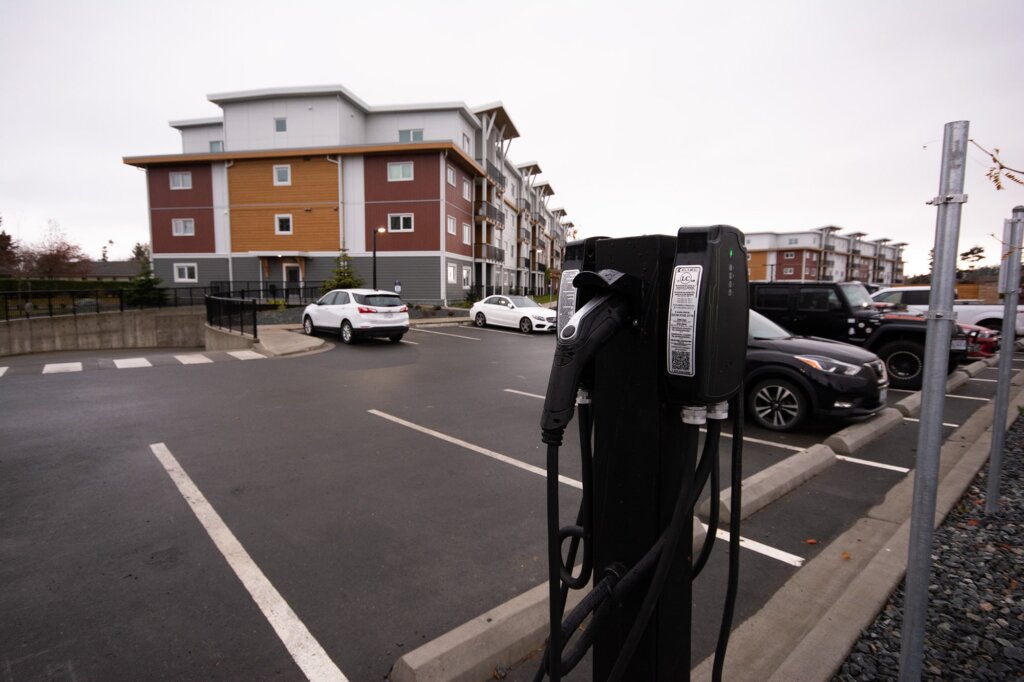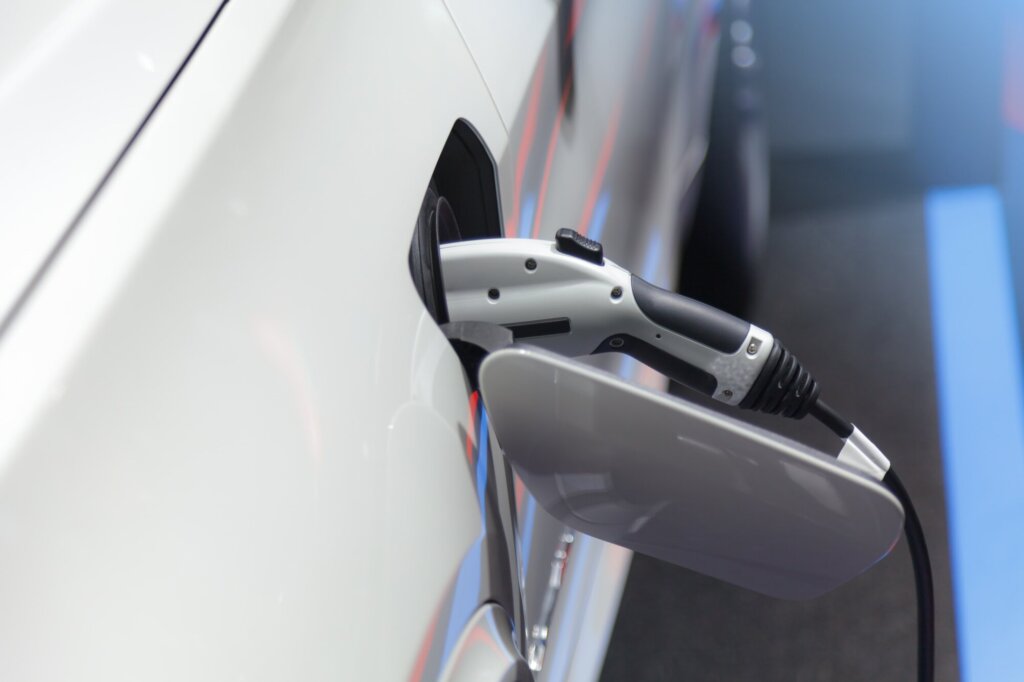Comprehensive and Cost-Effective EV Futureproofing for Multifamily Communities

Challenge: Understand what policies, investments and approaches can be taken to accelerate cost-effective, equitable access to EV charging in multifamily buildings across Canada.
Solution: A report that details the optimal approach to implement EV charging infrastructure in multifamily buildings at scale. Our report documents how comprehensive approaches that futureproof all parking for EV charging are typically the most cost-effective and convenient strategy on a life cycle basis. Such EV charging retrofit strategies can also enable broader building decarbonization by reserving limited electrical capacity for heat pumps and other electrification retrofits.
Impact: The report represents the first national roadmap for futureproofing multifamily buildings. It provides clear recommendations for overcoming technical and financial barriers, presents a detailed business case for investment, supports equity among residents, and recommends specific actions that governments, utilities, regulators, and lenders can take.
The Challenge and Urgency of Accelerating Accessible EV Charging in Canadian Multifamily Homes
We are amid a transition to plug-in electric vehicles (EVs). Driven by improving battery technology and rapidly reducing costs, automakers are retooling supply chains to produce EVs. Further underpinning this transition are Canada’s new Electric Vehicle Availability Standard and provincial zero emissions vehicles requirements.
It is critical that reliable, convenient and affordable EV charging be available to enable this transition. Charging at home is usually the most cost-effective and convenient solution. However, while installing EV charging in a single-family home is usually straightforward, residents in multifamily buildings face significant barriers to implementing home charging.
The experience from leading jurisdictions where EV adoption is highest (e.g. British Columbia) demonstrates that comprehensive futureproofing that provides EV charging infrastructure to all parking is the most cost-effective approach in both new construction and existing multifamily buildings. However, while such comprehensive EV futureproofing is the lowest cost approach on a life cycle basis, a variety of market failures prevent the condo and rental apartment sectors from implementing these approaches without supportive government policies and programs.
Commissioned by the Federation of Canadian Municipalities’ Green Municipal Fund (GMF) and the Low Carbon Cities Canada (LC3) network, and with the support of the Alectra GRE&T Centre and McCarthy Tétrault LLP, Dunsky developed a report that details comprehensive futureproofing approaches and innovative policies and programs to address these barriers and drive widespread adoption of EV charging in multifamily buildings.
The Business Case for a Comprehensive Approach to EV Ready Retrofits
Typically, buildings install only a few chargers at a time, which has proven inefficient and costly, lacking foresight for expansion and risking stranded assets. Our report highlights how governments and other actors can embrace a comprehensive retrofit strategy for existing buildings whereby all parking stalls are futureproofed for easy installation of EV chargers as households adopt EVs.
Our report documents the cost-effective futureproofing strategies enabled by EV Energy Management Systems (EVEMS). Comprehensive futureproofing can realize a number of benefits, including:
- Lower life-cycle costs compared to piece-meal approaches
- Avoiding stranded assets due to limited electrical capacity in buildings
- Increased convenience for drivers based on a simple, predictable charging setup
- Allowing drivers to reap the savings from EVs by enabling lower cost at home charging
- Generating revenue for multifamily buildings that provide EV charging.
- Providing an opportunity to align and plan broader building electrification efforts.
- Increasing the property values of impacted condo units.
Actions for Governments, Utilities and Lenders
Despite the benefits, comprehensive EV futureproofing requires a significant capital investment. Incentives and financing are necessary to help building owners overcome their high hurdle rates and lack of access to cash. Additionally, clear program structures supporting comprehensive futureproofing and standard specifications are required to support condos, building owners and industry.
Our report recommends key actions that can be taken by different levels of government, utilities, development financial institutions and non-profits to enable this comprehensive approach.
| Action | Who? |
| 1.0 Policy & Regulation | |
| 1.1 Update the model National Energy Code for Buildings (NECB) and the National Building Code (NBC) to require EV Ready new construction. | Federal govt., Provinces & Territories (P/Ts) |
| 1.2 Adopt best practice EV Ready requirements for new construction. | P/Ts, municipalities (Munis) |
| 1.3 Adopt “Right to Charge 2.0”, which entails requiring buildings conduct electrical planning reports to guide investments in EV charging and broader building electrification; simplifying approvals processes for feasibility studies; and reducing voting thresholds to 50% to approve capital investments in comprehensive futureproofing; and specifying that comprehensive futureproofing can be funded from condo reserve funds. | P/Ts |
| 1.4 Update utility policy, regulation, rates and programs to support widespread deployment of EV charging and broader beneficial electrification. | P/Ts, Utility regulators, Utilities |
| 1.5 Explore legislation and/or template condo bylaws and associated processes to enable legally exchanging parking spaces in condos and thereby enable phased retrofits, and to lower approval voting thresholds for futureproofing projects. | P/Ts, Federal govt., Development Finance Institutions (DFIs), Non-profits |
| 2.0 Incentive Programs | |
| 2.1 Offer incentives (rebates) for comprehensive EV futureproofing retrofit planning studies and infrastructure upgrades. In aggregate, we recommend incentives total approximately $3 billion by 2030. | Federal govt., P/Ts, Utilities |
| 2.2 Offer incentives specifically tailored to low- or moderate-income rental buildings and non-market housing. Consider Charging as a Service and utility “make ready” programs specifically tailored to the rental and affordable housing sectors. Include clauses in funding agreements that restrict rent increases, evictions and exorbitant user fees. | Federal govt., P/Ts, Utilities, DFIs |
| 3.0 Financing Programs | |
| 3.1 Introduce loan financing products to support comprehensive EV futureproofing. | DFIs – e.g., Canada Infrastructure Bank, Green Municipal Fund, LC3s, credit unions, and other public interest lenders |
| 3.2 Engage with the Canada Infrastructure Bank and consider aggregating EV futureproofing projects as part of the Building Retrofits Initiative. | DFIs |
| 3.3 Explore financing projects repaid with future Clean Fuel credit revenues. | DFIs, Federal govt., P/Ts |
| 3.4 Pilot Charging-as-a-Service, and quickly scale up if programs are deemed effective. | DFIs, Utilities, Federal govt., P/Ts, Munis, Charging service providers |
| 3.5 Pilot “Make Ready” utility investment in EV charging infrastructure, and quickly scale up programs if deemed cost effective. | Utilities, Utility Regulators |
| 4.0 Capacity building, standards & bulk procurement | |
| 4.1 Provide education and training related to comprehensive EV ready retrofits for condominium boards and rental building owners to understand the value proposition. | Federal govt., P/Ts, Munis., Utilities, Non-profits |
| 4.2 Develop a standard specification for networked EV charging services for multifamily buildings (and potentially other applications – e.g. workplaces), and an impartial means of testing and certifying service providers against the specification. | Federal govt., P/Ts, Utilities, DFIs, Non-profits |
| 4.3 Develop specifications and guidance for wholistic electrification planning studies and futureproofing practices. | Federal govt., P/Ts, Utilities, Non-profits & DFIs |
| 4.4 Explore bulk procurement of EV charging services for multifamily buildings (and potentially other applications – e.g. workplaces). | Federal govt., P/Ts, DFIs |
DFI= development financial institutions
By integrating these recommendations, governments, utilities, and stakeholders can have a significant impact on scaling EV charging in multifamily buildings and contribute to net-zero targets.
To learn more, we invite you to read the Briefing Note for Municipalities or consult the full report using the links below. You can also contact us directly at info@dunsky.com.
Related Projects
- Read more about New Report Details EV Adoption and Grid Impacts Across Every Province and Territory in an Evolving Landscape
New Report Details EV Adoption and Grid Impacts Across Every Province and Territory in an Evolving Landscape
October 8, 2025
The transition towards zero emission vehicles (ZEVs) is well underway, and while the end point is clear, the pace and…

- Read more about Unlocking Vehicle-Grid Integration in Canada
Unlocking Vehicle-Grid Integration in Canada
September 25, 2025
A new report from Dunsky prepared for CSA Group provides a comprehensive look at the Vehicle-Grid Integration (VGI) landscape in…

- Read more about Utility Projects on the Go
Utility Projects on the Go
October 18, 2024
Our team is currently supporting utilities on both coasts (and others in between) with a variety of strategic initiatives. Here…
